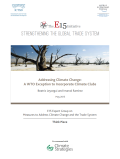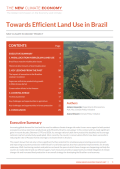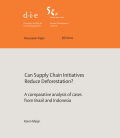In the wake of the Copenhagen Accord in 2009 and amid frustration with the slow pace of the United Nations Framework Convention on Climate Change (UNFCCC) talks, a number of bilateral and plurilateral efforts and technology initiatives has been launched to deal with international climate policy. Bilateral efforts such as the November 2014 joint announcement between the United States (US) and China have provided welcome momentum. These minilateral efforts, together with the broader multilateral ones, constitute the emerging “regime complex” for climate change. In such a world, ambition in climate action must come from national governments as well as from international agreements. For promoting such ambition, key tools include market-based mechanisms that cap emissions of carbon dioxide and other global warming pollutants, and allow nations and firms that reduce emissions below capped levels to save, sell, and trade surplus units of allowable emissions. Such systems are in effect today in more than 50 countries, states, cities, and provinces where almost a billion people live.

Despite diverse efforts in the past two decades, countries have not been able to create an international climate change regime that effectively addresses the challenges at stake. Meanwhile, the Arctic Ocean keeps melting, an area the size of Costa Rica is lost to deforestation every year, and low-lying islands could disappear by 2050 due to a rise in sea level. There are several other huge challenges posed by climate change, which urgently call for serious international action.

Increasing global demand for food and the need to address climate change risk make it ever more urgent to both protect ecosystems and use land more productively and efficiently. Brazil is a key player in this context and has made significant gains in recent decades. Between 1970 and 2006, its average national cattle farm productivity doubled and its average national crop farm productivity quadrupled. More recently, the country’s conservation efforts have been successful in reducing the rate of Amazon forest clearings to its lowest level in 30 years.
This report shows that not only is there significant further potential for simultaneously promoting economic growth and improving ecosystem protection within Brazil’s rural landscape but also that substantial improvements are already underway. Well-functioning markets and policies can boost the pace at which these changes are happening and help the country to realize latent land use efficiency gains. Such measures provide an opportunity to embed mitigation of climate change risk and increased food production in an overall strategy for developing the Brazilian rural economy.
In Morocco, the potential for solar and wind energy generation is enormous and could be exploited for addressing not only energy security concerns, but also pressing social and economic needs. Smart policy design that integrates different policy objectives can have long-lasting effects, stimulating competitiveness across the economy.

